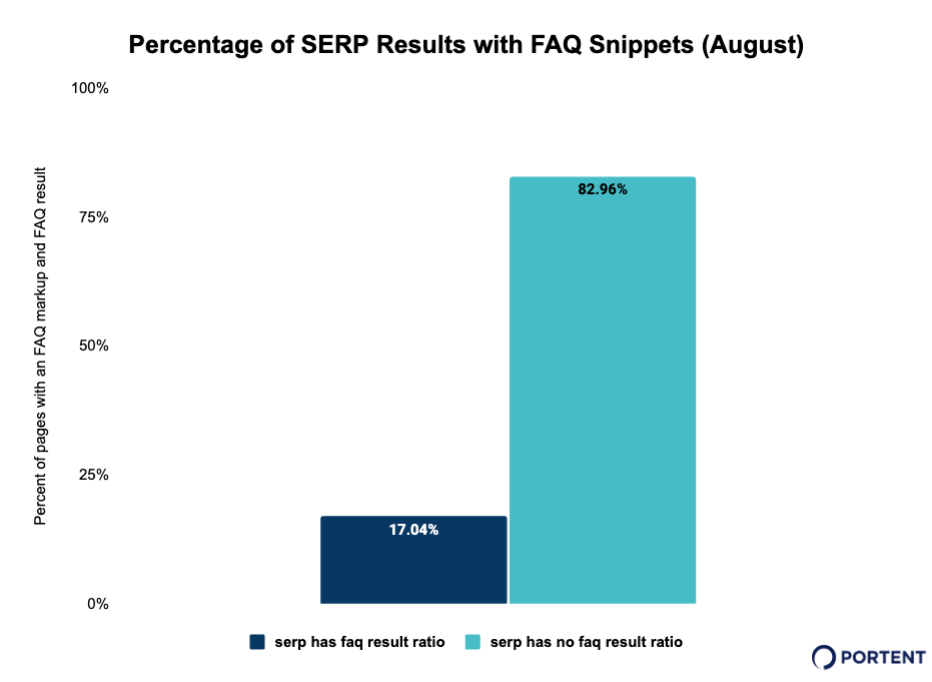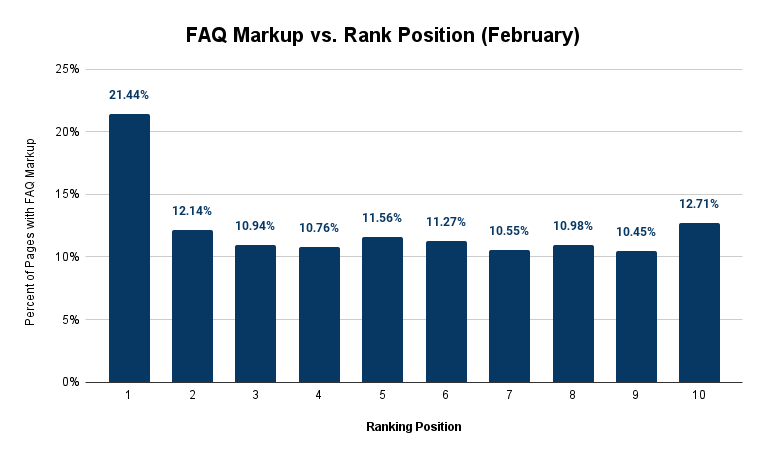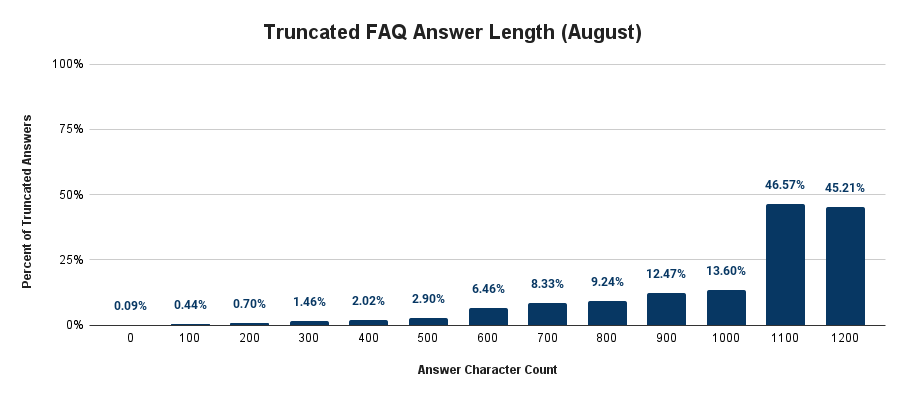In May 2019, Google announced FAQ structured data, drastically changing the SERP landscape.
Within days, SEO experts tried to push the feature as far as possible. Some people were jubilant with their findings, and others were fraught with dismay, but everyone was curious.
Since then, Google’s approach to FAQs in search has evolved into a straightforward feature, and the fervor has vanished. While a few companies performed tests to see how much an FAQ snippet affects organic traffic, like Semrush’s split tests, we haven’t seen studies about how FAQs work as a SERP feature and the parameters within which they function.
Instead, digital marketers have wandered through a dark cave chasing after FAQs for years without truly understanding their nature. We’ve stubbed our toes, sprinted face-first into dead ends, and slipped on guano too many times.
So, Portent’s SEO Fellow Matthew Henry, former SEO Architect Evan Hall, and I ignited torches and embarked on a journey to map this cave and track down FAQs in their natural habitat: search results.
In February, we used Portent’s proprietary crawler RainGage to crawl 313,160 pages in Google search results, which provided 85,572 unique URLs. We also scraped text and markup data from each page within the results.
In March, we scoured the results and came to some surprising conclusions, but then we tripped over an unexpected vine while writing the report and stumbled to a halt because, in April, Google made unannounced changes that significantly affected how often FAQ results appear.
Suddenly, our brand-new data was outdated.
While we waited to see if FAQ volatility settled, Google officially announced its FAQ rollback on August 8, 2023, saying, “FAQ rich results will only be shown for well-known, authoritative government and health websites. For all other sites, this rich result will no longer be shown regularly.”
After this announcement, we re-ran our crawl on August 15 and discovered that 82.96 percent of websites with FAQ schema no longer earn FAQ results, compared to 46.06 percent in February. The number of FAQs shown in SERPs has also decreased from 53.94 percent to 17.04 percent. We have a lot more data to dive into. Keep reading to nerd out about the study background and our analysis method. You can also jump straight to the study results.
Study Background
FAQs are a bit nebulous. You add schema markup to the page; voila, your search result has two FAQ results. Or the FAQ isn’t there, and you’re not sure why not. Sometimes, Google even adds an FAQ for content you didn’t markup, creating more confusion.
We sought to determine if Google has an obvious method to its madness and if we can develop guidelines around those methods to ensure FAQs appear more consistently.
We looked into the following questions:
- Does keyword ranking affect FAQ presence in the top 10 search results? (E.g., do pages ranking 1-5 have more FAQs than 6-10?)
- If your content is already ranking, should you use FAQ markup to improve your position?
- Will the same page show FAQ results for some search queries but not others?
- Does FAQ content have an average character count?
- When does Google truncate FAQ content?
- How short and long can an FAQ answer be?
- How short and long can an FAQ question be?
- Does the FAQ content in SERPs match the original content marked with the FAQ schema?
- If so, how often do the answers align perfectly?
- What are the consequences of Google’s FAQ rollback August update?
Study Method
Our priority was determining how many search queries we needed for statistical significance. After some discussion, we settled on using RainGage to search for at least 31,000 keywords.
Finding the Right Keywords
We focused on seed keywords from various verticals with a high likelihood of FAQs in the search results.
We looked into the following types of content:
- Home Improvement
- Mortgage
- Telehealth
- Cybersecurity
- Pet Adoption
- Hiking
We plugged our six seed keywords into Semrush and used its FAQ filter to help isolate which queries have a higher chance of FAQ snippets.

After eliminating duplicate queries, we had 31,316 keywords for our database.
Crawling Google

We crawled 31,3160 Google searches and set RainGage to return 10 results per query. We only crawled the traditional 10 “big blue links” and ignored other SERP elements, like advertisements, carousels, and videos.
This process gave us 288,432 results. Out of these results, there were 85,572 unique URLs, and RainGage successfully loaded 75,684 as HTML pages.
The 9,888 URL vs. page disparity is because we ran into a few hiccups by encountering PDFs and other non-HTML content alongside many URLs, returning error codes because the sites deliberately blocked crawlers.
After accounting for these setbacks, we had 32,149 Google results pointing to pages with FAQ schema markup. Many of these pages appeared in multiple search results, so our data set concluded with 6,661 unique pages with an FAQ result.
When we repeated our crawl in August, we ended up with 40,182 results with FAQ schema markup, 6,847 of which have an FAQ result. We assume that more people added schema to their content, which resulted in an increased data set.
An important caveat is that our data is geared explicitly toward search queries that are supposed to return FAQ results, at least before Google’s August update. Consequently, our results may not be indicative of general searches.
Crawling Ranking Pages
While crawling Google results was a complex task requiring troubleshooting and finagling, crawling the ranking pages was simple.
We used RainGage to crawl the page HTML and gather the following information:
- FAQ questions and answers, as designated by schema
- Character counts for the question and answers
- What Google shows as the big blue link text, which often aligns with the title tag
- Meta description
- Ranking URL
Study Findings
The most fascinating correlation we discovered is how often the number one ranked result includes an FAQ compared to the remaining nine results and how this data flipped after Google’s August update.
Which SERP Rank Gets the Most FAQs?

In our February crawl, we discovered that the number one ranking result was almost twice as likely to show an FAQ result as the other slots, with 12.05 percent of first-position rankings including an FAQ.
In our August crawl, the results changed dramatically.

The total percentage of FAQs shown drastically decreased, and the number one result is now less likely to include an FAQ compared to positions two through seven.
We don’t have a good explanation for this drastic change.
In February, it made sense that the top-ranking page would have FAQ schema because position-one results are typically more optimized than similar content. However, as our data shows, 8,033 more pages now have FAQ schema than in February, so we should have seen the data stay steady if that trend held.
The only reasonable explanation is Google’s update.
Since Google is pickier about what results get FAQs, the algorithm is apparently awarding the feature to different pages more evenly. We expect these results to change again as Google tweaks its new approach. It’s also possible that what ranks in position two will soon rank in position one, given how dominant position one content was in our February results.
That’s not the story’s end; Google’s treatment of pages with FAQ schema, regardless of whether they have an FAQ result, thickens the plot and adds even more confusion to the story.

In our February results, Google was almost twice as likely to choose a page with FAQ markup to rank number one compared to the other nine positions, with 21.44 percent of position one pages including FAQ schema.
This result makes a lot of sense when you combine it with our February data, showing that the number one result is more likely to have an FAQ. However, the August data flips the script.

Now, it’s 1.88 percent more likely that the page in the number one position will have FAQ schema, but 9.39 percent less likely it will receive an FAQ result.
This correlation has three potential causes. (If you have other insights, let us know in the comment section.)
- Google favors pages with FAQ schema and is ranking them higher. We don’t think this is true; it’s more likely that pages ranking in position one already have FAQ schema or added it once they earned the number one slot.
- Because the top-ranking page is more likely to be SEO optimized, our data represents more people following SEO best practices, and there’s nothing more to it. This is probably true, but it leaves a lot of lingering questions.
- Now that Google is more persnickety about awarding FAQs, the pages ranking number one no longer adhere to the updated algorithm’s guidelines and have lost their FAQ result. This is the most realistic outcome, but it doesn’t explain why the number two result is now 0.81 percent more likely to display an FAQ result.
Please remember to take these findings with a grain of salt because our dataset was chosen based on queries with a high likelihood of producing FAQ results. It’s not fair to assume these values perfectly apply to general searches.
The rest of our data is far less nuanced and doesn’t leave much room for interpretation, but we hope you find it insightful.
FAQ Results Across Different Search Queries
Considering most top-ranking pages rank for many keywords, we wanted to learn if FAQ results stayed consistent regardless of the search query. We looked at a set of pages with more than one top-10 SERP result but did not always show an FAQ result.
| FAQ SERP Prevalence for Pages With Multiple Top-10 Rankings | |||
|---|---|---|---|
| Crawl Date | Pages with FAQ Markup & Multiple Rankings | Pages with Multiple Rankings but Inconsistent FAQ Results | Percentage of Pages with FAQs, Multiple Rankings and Inconsistent Results |
| February | 3,386 | 898 | 26.52% |
| August | 4,230 | 846 | 20% |
Our findings are not surprising. Google will show the same page with FAQ results for some queries and without an FAQ for others. Considering how nuanced longtail queries can become, it makes sense that Google only shows an FAQ when it’s genuinely relevant to the user’s needs.
How Long or Short Can FAQ Content Be?
Going into this project, I expected that Google had unpublished character count guidelines for FAQ results; however, it turns out that Google is exceptionally random with how long the questions and answers it accepts can be.
| SERP FAQ Questions Character Limits | |||
|---|---|---|---|
| Crawl Date | SERP Questions Min. Character Count | SERP Question Max Character Count | SERP Question Average Character Count |
| February | 12 | 132 | 42.6 |
| August | 9 | 119 | 40.3 |
| SERP FAQ Answer Character Limits | |||
|---|---|---|---|
| Crawl Date | SERP Answer Min. Character Count | SERP Answer Max Character Count | SERP Answer Average Character Count |
| February | 7 | 1,130 | 324.8 |
| August | 3 | 1,353 | 304.2 |
I’m most surprised at how short questions and answers can be. You effectively have free rein to approach FAQs however you want.
The results grow more interesting when we compare the FAQ results to the copy with FAQ schema on the ranking page.
| SERP Ranking Page Questions Schema Character Limits | |||
|---|---|---|---|
| Crawl Date | Page Question Min. Character Count | Page Question Max Character Count | Page Question Average Character Count |
| February | 4 | 1,086 | 46.3 |
| August | 2 | 1,086 | 45.8 |
| SERP Ranking Page Answers Schema Character Limits | |||
|---|---|---|---|
| Crawl Date | Page Answer Min. Character Count | Page Answer Max Character Count | Page Answer Average Character Count |
| February | 1 | 61,237 | 318.5 |
| August | 2 | 61,237 | 45.8 |
The findings are fascinating because when we compare the results against the character count limits for live FAQ results.
For example, our data set’s max character count for an FAQ result question is 132, but we see page markup for questions up to 1,086 characters. So, one of two things is happening. Either Google skips extremely long questions, or it’s truncating them.
The same pattern applies to minimum character counts, with Google seemingly ignoring extremely short questions — especially when it’s not a real question — but sometimes allows one-word answers.
How Often Does Google Truncate FAQ Answers?
Google continues its inconsistencies with truncation.
The following chart uses our February crawl and shows a sharp uptick in truncated answers after 1,000 characters, with 24.74 percent shortened. The truncation sharply increases to 50.89 percent for answers 1,200 characters or more. After 1,200 characters, our data gets noisy because there are not enough answers in this character count range.

The results change slightly in our August crawl, but we attribute the truncation decrease to the smaller FAQ presence in SERPs.

In both cases, we recommend making your answer 900 characters or fewer.
Do FAQs always match the schema markup?
Yes. We did not see instances where Google rewrote an answer or question. Unlike title tags and meta descriptions, which Google often rewrites, you completely control what Google displays with FAQ schema.
FAQ Recommendations and Wrap-Up
The big question many people in the SEO and content marketing industries are asking in light of Google’s FAQ rollback in August is, “Should I still use FAQ schema?”
Yes, you should still use schema best practices when appropriate, including FAQ markup.
Schema markup will not harm your website. While it’s significantly less likely that you’ll earn an FAQ result, it’s still possible to receive them. Plus, we all know how finicky Google is. In a few months, the powers that be could change their mind again and feature more FAQs in search results.
If that adjustment happens, you’re better off having the schema in place instead of trying to catch up to the rest of us haphazardly.
After all, caves are dark, spooky, and slippery; who knows how lost you’ll become if you fall behind and wander too far from the burning torch.










I appreciate this data and the contemplative thoughts on what may or may not be happening behind the scenes. You are right that Google could change this all in a heartbeat.
Thanks, Travis!